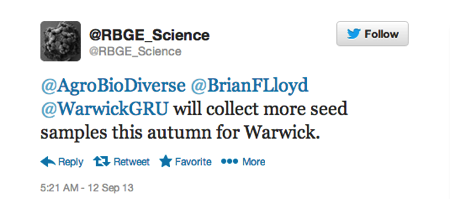- Global Climate Change Adaptation Priorities for Biodiversity and Food Security. Changes in crop suitability + changes in suitability for restricted-range birds = 10 priority areas.
- Whole-genome sequencing reveals untapped genetic potential in Africa’s indigenous cereal crop sorghum. Two domestication events. At least.
- Association analysis of seed longevity in rice under conventional and high-temperature germination conditions. 10 markers on 5 chromosomes explain 10% of the variation in seed longevity. Fascinating, but one wonders if the game is worth the candle.
- Analysis of DNA polymorphism in ancient barley herbarium material: Validation of the KASP SNP genotyping platform. It’s a brave new world we live in.
- DNA evidence for multiple introductions of barley into Europe following dispersed domestications in Western Asia. European Neolithic barley falls into 3 distinct groups which originated in different places in the Near East and entered Europe via different routes at different times. And they didn’t even look at herbarium material.
- Plant breeding for nutrition-sensitive agriculture: an appraisal of developments in plant breeding. Pick your target, bring in complementary expertise, and don’t rely on the commercial sector.
- Impact of Improved Seeds on Small Farmers Productivity, Income and Livelihood in Umruwaba Locality of North Kordofan, Sudan. Dismal scientists tell farmers to adopt improved peanuts based on bunch of clever maths. What could possibly go wrong?
- Classification of Croatian wine varieties using multivariate analysis of data obtained by high resolution ICP-MS analysis. 75 of them!
- Analysis of genetic diversity and structure of eggplant populations (Solanum melongena L.) in China using simple sequence repeat markers. 92 accessions, 7 geographic ares, 4 clades. As ever, “(t)he results will be useful for eggplant germplasm management and will lead to more efficient use of germplasm in eggplant breeding.” Riiiiiight.
- Heritability, variance components and genetic advance of some yield and yield related traits in Ethiopian collections of finger millet (Eleusine coracana (L.) Gaertn.) genotypes. Some simple selection could improve yields.
- Feasibility of Using a Community-Supported Agriculture Program to Improve Fruit and Vegetable Inventories and Consumption in an Underresourced Urban Community. In smallish randomized controlled trial, 5 educational sessions and a box of fresh produce for 16 weeks results in more diverse foods in the house, and maybe even more fruit and veg consumption, compared to households which got nothing. Which is good, but the comparison doesn’t seem fair, somehow.
Botanic gardens conserve crop diversity too, two.
Speaking of social media, Royal Botanic Gardens Edinburgh just published an interesting post entitled Botanic gardens conserve crop diversity too. 1 The crux of the matter is that RBGE tweeted about having collected some wild relatives of cabbages and other veg. A picture of one cabbage caught Luigi’s eye, as pictures of wild relatives often will, and he in turn discovered that the population from which it came is not represented in the UK’s leading collection at the Genetic Resources Unit in Warwick. Horrors! As he said at the time:
[T]he material mentioned in the Edinburgh tweet, which comes from Fife in Scotland, is likely to add significant diversity to the “national” collection at Warwick. Scope for some closer collaboration between these two institutes? Well, maybe it’s already there and I haven’t caught it. Do let me know if I’m being unfair.
@RBGE_Science shot back a tweet.

Fast forward less than a week, and RBGE now has this to say:
Seed samples from wild collections … will be passed to the Genetic Resources Unit at Warwick to enhance their CWR collection. An example of the value of this collaboration is provided by the fact that Warwick currently has no Scottish origin wild cabbage. … [T]his in turn will provide further ex-situ conservation for what is quite a rare plant in Scotland.
Was Luigi being unfair? Or should he take full credit for furthering cross-border collaboration in the important matter of cabbage wild relatives?
Genebank managers manage to have a good time
Luigi has been tweeting up a storm from the genebank managers meeting in Ames Iowa. If that’s the kind of thing that interests you, look for his hashtag, #ames13. Even if it isn’t, you might take a look for an object lesson in how to use social media.

This morning they’re off on a field trip. Will that slow him down? I doubt it.
Brainfood: Identifying GMOs, European beans, Palm distribution, Croatian cattle, Beta biodiversity, Apple pollination, Chinese foxtail millet, New Brassica, Pennisetum & latitude, Egusi oil
- Next-Generation Sequencing as a Tool for Detailed Molecular Characterisation of Genomic Insertions and Flanking Regions in Genetically Modified Plants: a Pilot Study Using a Rice Event Unauthorised in the EU. A rice event? They mean GMOs.
- Genetic Diversity and Dissemination Pathways of Common Bean in Central Europe. Slovenia is mainly Andean, Austria a mixture of Andean and Mesoamerican.
- Spatial distribution and environmental preferences of 10 economically important forest palms in western South America. It’s the water, stupid.
- Genetic variability of microsatellites in autochthonous Podolian cattle breeds in Croatia. Istrian cattle and Slavonian Syrmian Podolians are similar, but not identical. I dunno, I just hope someone is keeping track of all this stuff.
- Biodiversity Assessment of Sugar Beet Species and Its Wild Relatives: Linking Ecological Data with New Genetic Approaches. Where to find them, and how to use them. EcoTILLING is the way to go, apparently.
- Biodiversity ensures plant–pollinator phenological synchrony against climate change. The more pollinators, the better.
- Molecular diversity and population structure of Chinese green foxtail [Setaria viridis (L.) Beauv.] revealed by microsatellite analysis. Domesticated has geographical structure, wild does not. Origin in N China.
- A new species of Brassica sect. Brassica (Brassicaceae) from Sicily. It never ends.
- Latitudinal patterns of diversity in the world collection of pearl millet landraces at the ICRISAT genebank. Aim for 15°–20°.
- Genetic Mapping of Seed Traits Correlated with Seed Oil Percentage in Watermelon. Egusi, to be precise. Aim for bigger seeds.
Nibbles: Lathyrism, Ancient maize, Sustainable cacao, Bioversity on agrobiodiversity, Weird fruits, Carrot seed, Palm wine, Buckwheat, Halophytes issue, Weird(ish) crops, Urban malnutrition, Old oranges, Molasses, Indian tree institute
- An ODAP detective story.
- Ancient maize gets a map.
- Diversity is the key to sustainable cacao.
- New Bioversity DG answers the tough questions.
- Be the first on your block with an unusual fruit tree.
- How to grow awesome carrot seed.
- The hard life of Nigerian wine tappers.
- Bringing back buckwheat in Bhutan.
- Annals of Botany to do halophytes.
- Come down to earth with the realization that most people have never heard of cowpea and cassava. Would they have heard of black-eyed peas and tapioca, though?
- Big report on urban malnutrition. Maybe cassava (see above) can help?
- The last orange grove in the San Fernando Valley. No word on what the variety might be.
- All about molasses.
- Indian tree breeding institute, and accompanying genebank, get a write-up.
- Yes, I know that I could have done a better job of pointing out the connections among some of these things, but it’s been a long week.